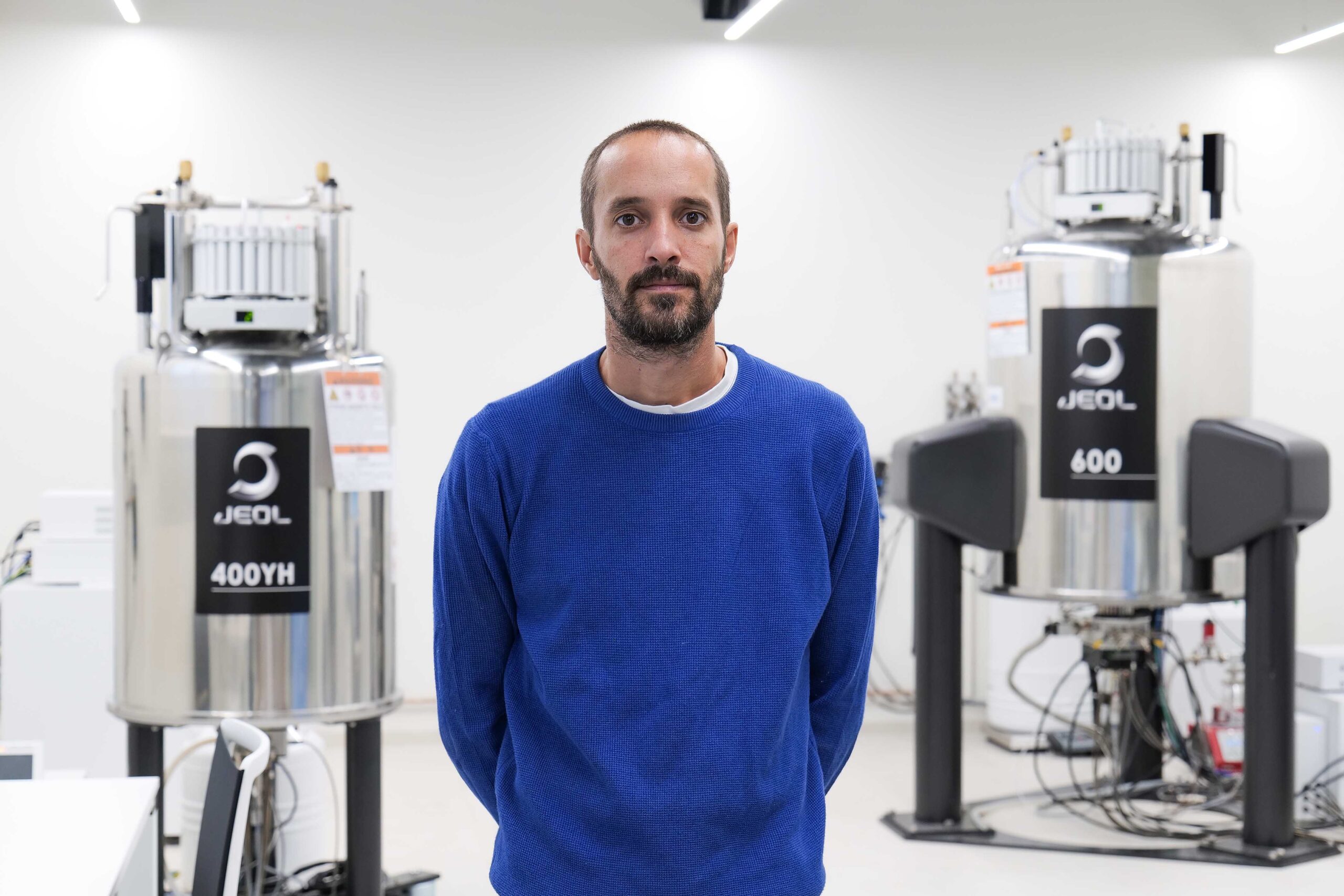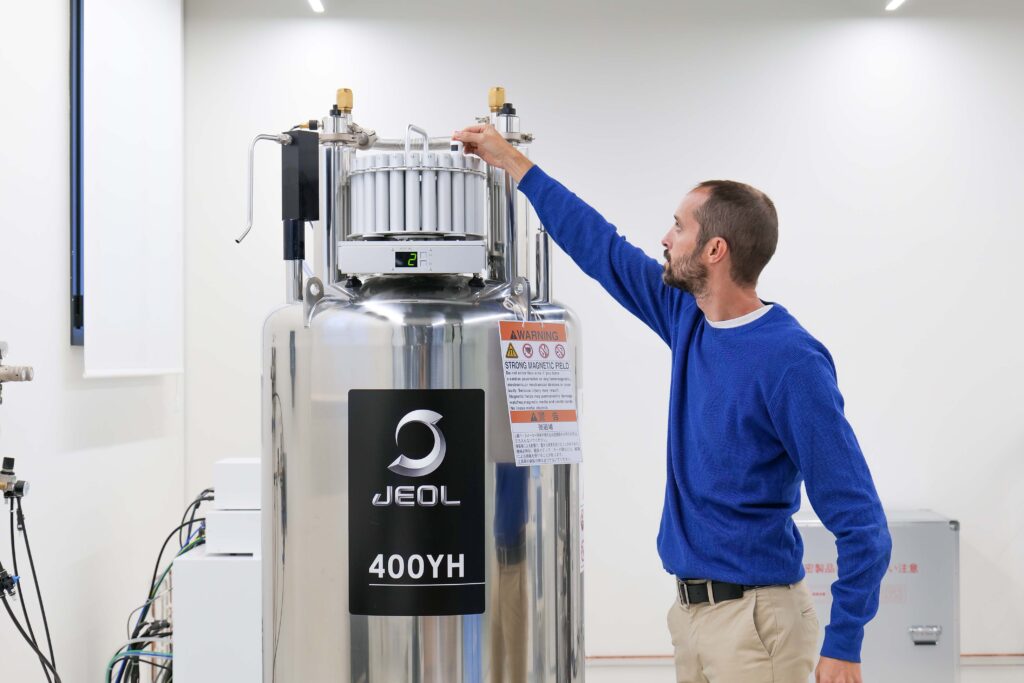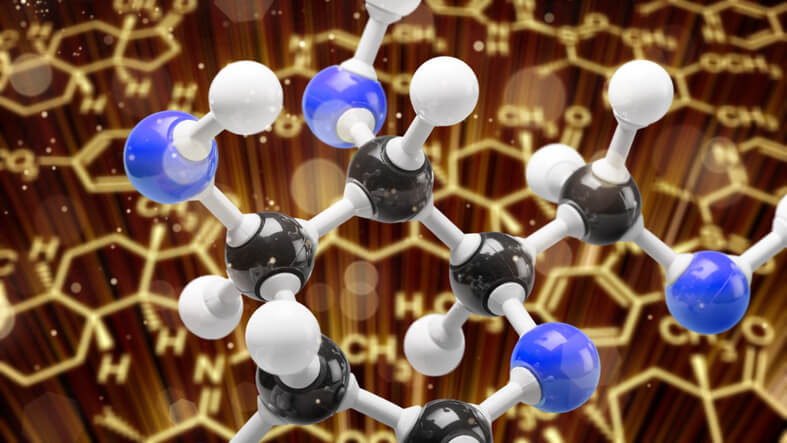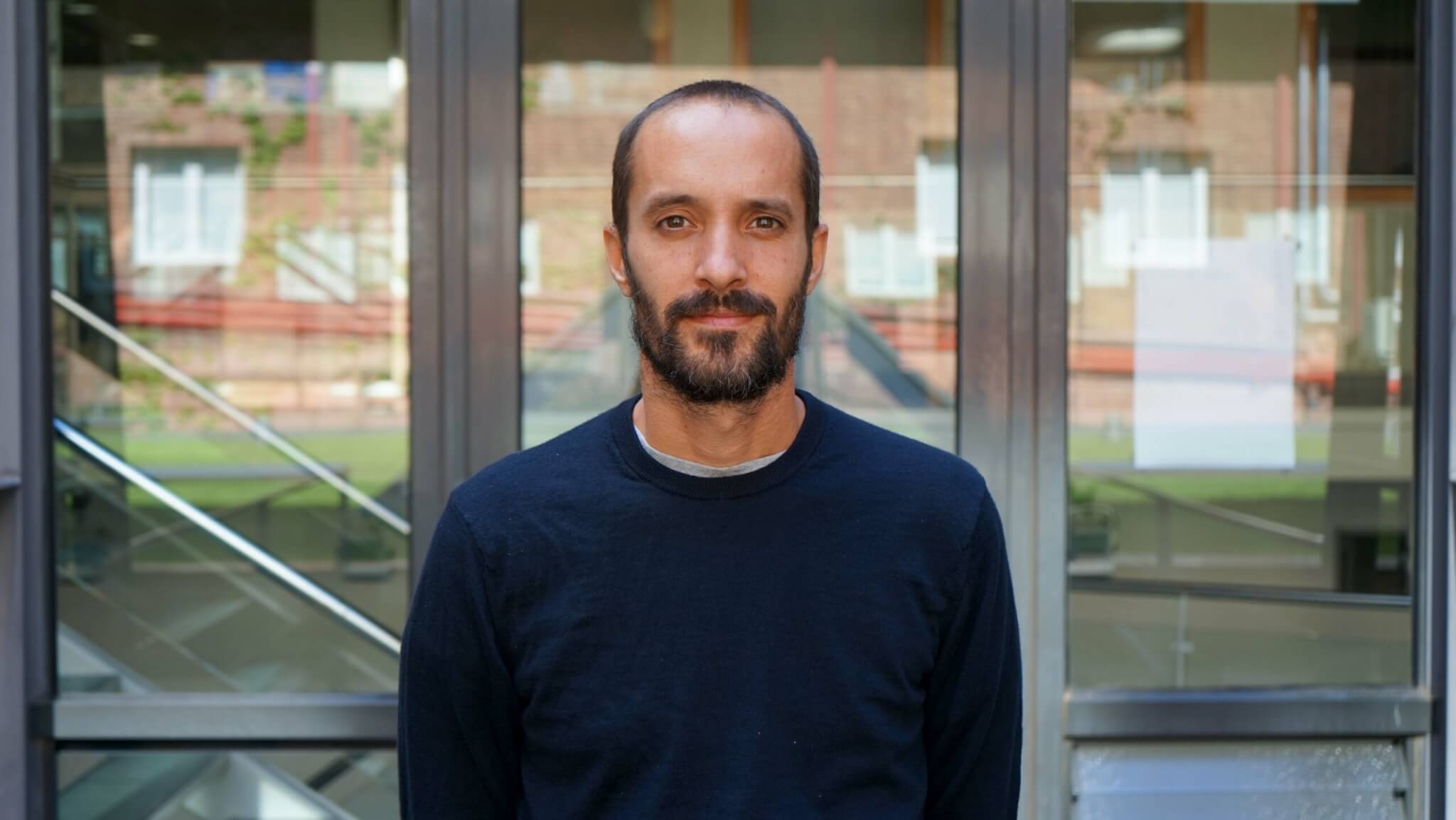IQS has recently launched the new IQS – JEOL platform, a Demo Lab that has two Nuclear Magnetic Resonance (NMR) instruments from the Japanese company JEOL, which will be the first on the Iberian Peninsula. The IQS – JEOL Demo Lab is a space with advanced technologies that has two state-of-the-art spectrophotometers: a 400 MHz hybrid system for solids and liquids, and a second 600 MHz system, equipped with a cryogenic nitrogen probe that will make it possible to reach much higher sensitivities in a wide range of cores. With this new installation, IQS is increasing and diversifying the services it can offer to pharmaceutical companies and research projects.
"I am passionate about working on structural elucidation methodologies and providing service to research and technology transfer"

Dr Josep Saurí Jiménez, a researcher with the Chemical Reactions for Innovative Solutions (CRISOL) research group, is leading this new IQS area, along with Dr Xavier Batllori Aguilà and Dr Albert Gibert Bosch. Dr Saurí is a recognized expert in the field of nuclear magnetic resonance methodologies and the structural elucidation of organic, pharmaceutical, and natural product compounds. He has been a member of the young researchers editorial board of the journal Magnetic Resonance in Chemistry and, since 2021, he has been co-editor of the annual publication Spectroscopic Periodical Reports in NMR by the Royal Society of Chemistry.
Today we are discussing his research career and the new challenges that IQS is tackling with the new IQS – JEOL NMR platform.
Josep, what has your scientific career been like?
I did my doctoral thesis at the Autonomous University of Barcelona, with Dr Teodor Parella Coll, within the field of NMR spectroscopy as the synthesis laboratory did not really appeal to me. My thesis was really interesting, fun, and successful. Thanks to it, I won one of the two prizes for the best doctoral thesis in this field in 2014, awarded by the specialized NMR group within the Spanish Royal Society of Chemistry. The thesis focused on the development and application of new NMR methodologies for the measurement of coupling constants, an area that can be of vital importance in complex cases for the elucidation of small organic molecules, especially with regard to their stereochemistry.
After completing my thesis, and through the collaboration of my thesis supervisor, I had the opportunity to obtain a postdoctoral research position with the company Merck & Co. Inc. – New Jersey, in the United States. It was a fantastic two years, with incredibly interesting research and countless publications, where we designed and applied, above all, new NMR methodologies combined with the use of advanced computational techniques for the elucidation of complex molecules of diverse origin.
“At Merck, we design and apply new NMR methodologies for the elucidation of complex molecules”
It was an exciting period of work in which I was able to come into contact and collaborate closely with research groups working with natural products, many of them of marine origin, which needed tools to elucidate and characterize them. It’s an area that has always attracted me greatly, especially when these products have some kind of activity. It has probably been one of the periods I have enjoyed the most so far and, furthermore, it was also very productive.
This was followed by a research position that opened within the NMR structural elucidation group at another Merck centre, this time in Boston. I applied for this position and was accepted, this time with an analytical support role from MRI techniques to early-stage research projects (“Drug discovery – early stage”). In this case, I had the opportunity to work with experts in Medical Chemistry and, again, I spent four-and-a-half incredible years doing really enriching multidisciplinary work.
Then you decided to come back to Barcelona?
Yes, it was time to come back to Barcelona even though the job market here in the field of NMR is quite small and static. First, I went back to the UAB as an associate professor for a year. Then, I was contacted by Dr Ana Belén Cuenca, director of the Department of Organic and Pharmaceutical Chemistry and coordinator of the CRISOL group at IQS, along with Dr Alexandr Shaffir, a collaborator with this research group. Dr Cuenca stressed the desire that IQS has to grow in this area, as well as expanding and improving the NMR laboratory.
Being able to join an expanding and growing spectroscopy unit, like the one that has been installed at IQS, seemed like a great opportunity to me. I initially started at IQS as an associate professor, with the intention of contributing an important part in the renovation and implementation of NMR instrumentation at IQS.
“Joining an expanding and growing spectroscopy unit like the one at IQS is a great opportunity”
Can you tell us about IQS’s commitment to the JEOL instruments in this decisive renewal?
IQS has decided to renew the NMR instrumentation it currently has, a Varian 400 MHz equipment, and as part of this commitment, it has reached an agreement with the Japanese company JEOL to acquire two of its instruments: a 400 MHz NMR spectrometer, similar to the Varian we have now, but which incorporates a solids probe, and a second 600 MHz device with a “cryoprobe” that gives it a higher sensitivity than can be achieved with probes that work at room temperature.
With this agreement, IQS is taking a significant step towards the renewal of the NMR devices and providing services to business. The school is going from having a single device to having two that are much more modern and powerful, and featuring the availability of new probes such as the “cryoprobe” and the “solids probe.” We’re positioning ourselves at the same level as other similar laboratories at other institutions.
“IQS is taking a significant step towards the renewal of the NMR devices and providing services to business”

What will make IQS stand out?
The difference is that we will be an NMR IQS-JEOL laboratory, which makes us pioneers as it is the first JEOL platform with these characteristics on the Iberian Peninsula. In addition to being exciting, this is also a great challenge in the sense that IQS will have JEOL equipment, while the vast majority of spectrometers in Spain are from the Bruker brand, which is well established in European and US markets.
“The IQS-JEOL NMR laboratory is the first JEOL platform with these characteristics on the Iberian Peninsula”
JEOL has been in the NMR market for many years, but has historically focused on the Asian market basically. Over the last decade, it has slowly expanded more and more into Europe, showing its intent to compete on the European market.
Is it a beneficial situation for both parties?
Absolutely. The agreement signed between JEOL and IQS not only provides the two instruments to the school, but it is also designed so the platform can operate like a Demo Lab so JEOL can use the space at IQS from time to time to hold seminars and highlight their technology to clients. Therefore, we’re all committed to the excellent operation of the platform installed at IQS.
It has also been designed so an IQS-JEOL NMR Summer School can be held to offer seminars and workshops with these instruments to provide a scientific programme to train and guide users in this technology. On one hand, this should give JEOL greater visibility in terms of seeking potential clients. On the other hand, it’s a magnificent opportunity for IQS to gain greater visibility and actively showcase the school.
“For IQS, the new platform is a magnificent opportunity for IQS to gain greater visibility and actively showcase the school”
How does it impact IQS research groups?
We hope and wish that these new devices can provide help and support to all researchers and give them exceptional service. From a research point of view, there are many synergies and possibilities for all these lines of research that require advanced structural elucidations, or many other types of studies that NMR can offer since it is a very versatile tool.
In my own case, I aim to continue developing my academic career at IQS and starting my own research projects.
What does the JEOL platform offer to companies?
For industry, it’s the same. The JEOL 400 will enter self-service, while the 600 will be aimed at supporting IQS’s research and collaborations with other universities and groups, as well as providing service to external companies, as has been done so far with the Varian 400 under the leadership of Dr Xavier Batllori and Dr Albert Gibert.
It’s quite a significant change with respect to the NMR service that we have had up to now and IQS has been offering for a long time, which we want to reinforce. The installation began in mid-May, and we’re inaugurating it now in October.
The IQS – JEOL Demo lab is a spectacular space that we have just inaugurated.
Finally, how are things for you at IQS?
I’m really happy… and excited to start working on everything! Like I said before, I’m passionate about working on structural elucidation methodologies and providing services to research, companies, and technology transfer.
I’m thrilled to complement research with teaching, but I want to start with the actual work dynamics. I’m really excited to work with everyone and be able to collaborate with them! IQS is a fairly small campus, but it’s growing and will grow even more! I hope to be able to bring all my knowledge to this project, with the new laboratory operational and providing service day in and day out.











